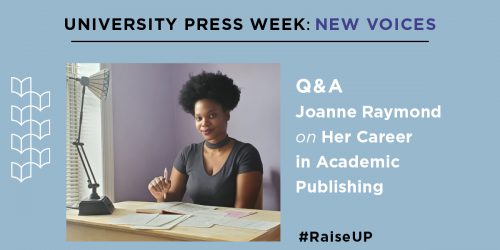University Press Roundup
Welcome to our weekly roundup of the best articles from the blogs of academic publishers! As always, if you particularly enjoy something or think that we missed an important post, please let us know in the comments. (And look back at our University Press Roundup Manifesto to see why we do this post every Friday.)
Congratulations to the University of North Carolina Press! As detailed on the UNC Press Blog, the press has just been awarded “a $998,000 grant from the Andrew W. Mellon Foundation of New York to support the development of capacities at university presses for the publication of high-quality digital monographs.” This news is, needless to say, very exciting, as are the plans the press has for the money: “The funding will be used to create a scaled platform where university presses will collaborate to achieve cost efficiencies on a broad range of digital publishing activities, including copyediting, composition, production, operations, and marketing services.”
On from one form of digital innovation in scholarship to another: the University of Toronto Press Publishing Blog has a fascinating post up this week about a “digital humanities project” undertaken by a professor using a UTP history title. An instructor at Wifrid Laurier University, Alicia McKenzie, taught a class on the Viking Age using The Viking Age: A Reader as the primary text. In order to prompt in-depth interaction with the primary texts contain in the reader, McKenzie had her students annotate one or more documents from the Viking Age and then create a digital exhibit based on the annotations. In her post, McKenzie describes how successful these projects were, and details some of the lessons she learned in the process.
The Imitation Game, a recently released film based on Alan Turing and the German Enigma code, has received generally glowing reviews, but at the Yale Books Unbound blog, Sharon Bertsch McGrayne argues that, while it’s a “good yarn,” the movie is “a gross distortion of Turing’s character,” with most of the changes made in the interest of making a potboiler at the expense of accuracy.
Before Patrick Modiano won the Nobel Prize in Literature this year, he was a little-known author in the anglophone world with few of his books translated into English (be sure to read Suspended Sentences, a trilogy of excellent Modiano novellas published by Yale University Press!). This week, The Chicago Blog of the University of Chicago Press featured an interview with Alice Kaplan in which she discusses all things Modiano, from his academic reputation to her own discovery of his work.
2015 is the 50th anniversary of the Immigration and Nationality Act of 1965 (also referred to as the Hart-Cellar Act, which “abolished country based quotas as the basis for immigration. It prioritized instead skills and family reunification, opening the doors to new waves of immigrants from Asia, Africa, and other parts of the world that had been previously restricted.” At the University of Washington Press Blog, Nalini Iyer and Amy Bhatt have a guest post detailing the impact of the Immigration and Nationality Act over the past fifty years, as well as looking ahead to the celebrations of the anniversary taking place this year.
At the University of Minnesota Press Blog, Christopher Freeman and James J. Berg, teachers of a class on Christopher Isherwood’s craft, have begun a blog post series in which they will share exemplary student essays from that class on the UMP blog. The first of these essays, by Jackson Burgess, takes a look at “three processes—dissociation, self-mechanization, and loss of composure—as different lenses through which to examine grief, and ultimately make a statement about death and its necessary beauty” as found in Isherwood’s A Single Man.
In 1993, China banned the domestic trade in tiger bone, an ingredient in some types of traditional Chinese medicine. However, in the years following, the numbers of Chinese tiger farms has actually skyrocketed, as has demand for tiger products. At Beacon Broadside, J. A. Mills lists 10 little-known facts about tigers and tiger farms, and argues that continued tiger farming will lead to the elimination of the few populations of wild tigers remaining.
How are we learning about exoplanets and the way they are formed? Writing at the OUPblog, Iris Schrijver and Karel Schrijver discuss new developments in our search for planets outside our solar system, especially including the progress made by a new observatory, “ALMA” that works with “microwaves that lie even beyond the infrared color range.”
Finally, we’ll finish things up this week with the latest entry in the WesPress Blog’s Throwback Thursday poem series, in which they present Amy Newman’s “To come to rest; strike bottom; land: The world first fell from the firmament.”
Thanks for reading! As always, we hope that you enjoyed the links. Please let us know what you think in the comments!



